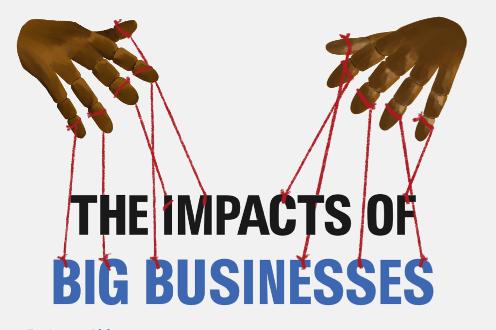


Capitalism is the foundation of the modern, especially western economy. Though competition and the idea of social darwinism, consumers are able to see many benefits of capitalism, though better quality goods and services for lower prices as companies compete for marketshare.

However, with the benefits of capitalism, there are many negatives that follow. From monopolies to inequality to poverty, capitalism provides a breeding ground for many of the world’s problems that keep many from achieving a good quality of life. These problems are difficult to address especially with money at the root of the issue, and change is often slow, if present at all.
In this issue of Humanité, we will explore the various issues of capitalism and their implications in our world. By focusing on both the issues and solutions, he hope to provide insight on how we can best address and improve this key aspect of modern society and economy.
By Jason Shin Layout by Haven Cha
Following the past twenty years, witnessed by the development of technology and the internet, the prevalence of big businesses have increased tenfold, especially seen with the creation of social media, as companies such as Facebook, Instagram, and even Youtube, have dominated the world. Aside from just the internet, the growth of technology has also caused the creation of tech-companies such as Tesla or Apple. The growth of big businesses only marginalized small businesses and soon monopolies became more prevalent, such as the monopoly in the ECommerce industry with companies like Amazon, or even the monopoly in the social media sector with companies like Tiktok. The constant development of new technologies and the rise of big businesses begs the question: do these businesses really cater towards the goal of utilizing the technology to its full potential, or are
they just simply there to exploit the lower classes and garner as much profit as possible?
In a capitalistic society, where a company’s inherent value is appraised through their profit, assets, and their market value–in other words, money–a company’s natural incentive leans towards attaining those exact things. This means that it is in the very nature of the company to earn money, because without it, they will not be able to exist. However, with the recent rise of technologies such as the phone or the computer, and the increasing social reliance on those technologies as a society, the power and influence that these companies have, have become concerningly high, meaning that in their pursuit of attaining those goals of money and profit, they often end up disenfranchising certain lower class parties all-together. This means that because their perspective and



their scope is much broader and larger than most smaller companies, they are always going to end up hurting one certain party or another. This is especially true with the development of other large companies, thus increasing competition. For example, when Apple and Samsung were competing, their aggressive approach at patenting new technologies,and trying to hoard the most amount of computer resources\ ended up hurting small businesses and small creators, who live off of creating those technological innovations. So fundamentally, regardless of the business’ intentions, they always end up harming a party. However this excludes the possibility that some corporations have direct motivation of garnering as much profit as possible. This means that already on top of the harsh differences between small and big companies and their harm, they can add even more pressure to certain industries by raising prices and buying out smaller companies for example. Therefore on both ends, where a company actively seeks profit and where a company doesn’t, there always is a certain party that gets harmed. For example, Tesla’s attempt at automating the development of their car, also ended up laying off thousands of factory workers who lived off of the wages that the company provided.
Admittedly, while big corporations do provide large amounts of harm to certain minority parties, the ultimate technologies that they advance and the products that they pan out to the public, outweighs the harms of big corporation monopolies. The development of Facebook or Instagram for example while admittedly boxing out smaller tech companies and harming them, also created a platform where indi viduals can talk to communicate and in teract with each other, this platform being one of the main sectors of the internet–so cial media. SpaceX for example, provided groundbreaking rocket technology that allows scientists to fly and land rockets, and half the fuel and resources that NASA estimated that the technology would
expend. Sure, the development of technologies can be seen through governmental efforts or through other scientific efforts as well, however, the competition between the existence of corporations, the products that some produce, and the assets and profits that they can use pans out greater research and development to these technologies. SpaceX with their groundbreaking technology, has almost outcompeted NASA, a government agency. Blue Origin, another space company by Jeff Bezos, also became a large competitor in the industry as well. Which means that not only is there competition and opportunities for further research to happen in a certain industry, there are also other diversified perspectives that can arise through the development of the technology as well. For example, in the competition with Apple and Samsung, Samsung created a new photographic technology that revolutionized the phone, while Apple produced a new processing chip for their phones and computers to help with faster data processing with less hardware resources. Both companies are all from the same industry, however they both produced two different results. All of which were products that were able to be used by the public.

THE TIE BETWEEN CAPITALISM POVERTY AND
Written by Everlyn Chong
Layout by Haven Cha
Capitalism, an economic system based on private ownership of the means of production and their use for profit, is prominently seen in today’s world. Originating from Europe in the 19th century, Capitalism has been the dominant economic system in many countries since its inception. Countries like the United States, Singapore, and South Korea are all economically developed nations that run on a capitalist system.However, even though capitalism has allowed for significant economic growth in many countries, it is commonly criticized for perpetuating poverty.
Capitalism promotes competition between businesses, which results in worker exploitation for the sake of profits. workers around the world commonly endure hazardous working conditions only to receive little pay. As a result, there is an increase in the number of people who are struggling to make ends meet and a concen-
tration of wealth in the hands of a select few. Furthermore, the inability of low-income communities to access decent education and employment prospects keeps people in poverty and prevents them from climbing the economic ladder.
Additionally, in capitalist nations, poverty is made worse by the absence of government intervention. The market is assumed to govern itself in an ideal capitalist economy, yet this frequently leads to a failure to satisfy the needs of underprivileged people. Vulnerable populations lack access to basic essentials like food, housing, and healthcare when there is a weak social safety net in place. As a result, poverty is difficult to get out of, creating an endless cycle that is passed down through the generations.
However, it’s crucial to remember that capitalism is not the only factor contributing to poverty. Poverty is largely sustained
by structural issues, including institutional racism and inequality. However, capitalism’s emphasis on profits rather than people can aggravate these fundamental problems and lead to an increasing wealth inequality.

Capitalism and poverty are intertwined, as the economic system focuses on the profits, making the working class sink deeper into poverty. Although this economic system is
capable of bringing great profits, it is important to emphasize that the never-ending cycle of poverty the working class will go through and to address solutions in order to decrease the wealth gap.
The Tale of a Monopoly:
 by Russell Jin layout by Sophia Park
by Russell Jin layout by Sophia Park
“Big Tech” has an undeniable presence in each of our lives. Monopolies in the technology industry, such as Google, Apple, or Amazon are lauded and praised for the products and services they provide. However, there is a darker side to the story—the very same companies that we idolize are surreptitiously abusing their power, and the mere existence of these tech monopolies have often had detrimental effects on society.
To understand their current dominance, it is essential to know their history. Google was founded by Larry Page and Sergey Brin in 1998. It initially started out as purely a search engine, and Eric Schmidt quickly took over the operations as it experienced rapid growth. Google gradually expanded to provide many different services such as Gmail, YouTube, and Google Meet, becoming the huge conglomerate it is today.
After the business gained traction, Google started acquiring startups, which allowed it to tap into more markets. Firstly, it acquired Android for $50 million in 2005, entering the operating system industry. In 2006, it took ownership of YouTube, purchasing it for $1.65 billion. This also enabled it to control a part of the social media market. However, Google’s most successful acquisition was DoubleClick, which they acquired for $3.1 billion in 2007. It is a service which allows advertisers to easily create and publicize their ad, as well as be provided with valuable analytics. Advertising remains Google’s most profitable source of revenue.
While the story of Google may be regarded as one about success, it also reveals a sinister fact—too much power will inevitably lead to corruption (this is quite ironic, considering
how Google’s motto used to be “Don’t Be Evil”). A Wired article by Rory O’Connor states that Google was accused of unfairly using its dominance in search to promote their own products by antitrust regulators. Additionally, they were accused of collecting private online information using their Street View cars. The article goes as far as to say that Google may be facing an existential threat. In other words, the company may shut down in the future if such incidents continue. While this may not have been the case so far, Google continues to be inundated by lawsuits. On the 24th of January, 2023, the U.S. Department of Justice sued Google yet again for having “corrupted legitimate competition in the ad tech industry by engaging in a systematic campaign to seize control of the wide swath of high-tech tools used by publishers, advertisers and brokers to facilitate digital advertising.” In other words, Google has attempted to take complete control over the advertising industry
using their power as a monopoly.

It is undeniable that the situation looks quite grim for Google, but the perspectives of consumers must also be considered. It is quite a quandary when such a company is accused of unethical practices. On one hand, continuing to use their products means one is willing to give up their privacy and rights. On the other hand, there are no other substitutes which provide the same quality. This leaves users in an inconvenient situation where there is no good choice. Hence, it appears that the optimal solution is for competitors to emerge and challenge the dominant power. Fortunately, some attempts are being made to compete against Google. For instance, the meteoric rise of ChatGPT proves to be quite a relevant threat. According to The Guardian, Google’s own AI, Bard, displayed inaccurate answers during a live demonstration, causing shares to drop drastically in value. This is in stark contrast to ChatGPT,
which has been acclaimed as being “the best artificial intelligence chatbot ever released to the general public,” as stated by the New York Times. Moreover, Google’s competitor Microsoft announced that it would be using the technology behind ChatGPT to enhance Bing. All in all, monopolies can only be brought down by the emergence of superior products or services, which mitigates the cost of adjusting for customers.
In conclusion, these tech giants have a huge impact on society. Google, in particular, is a tech monopoly with unprecedented power and reach in many markets. However, it was revealed that their dominant grasp over the industry came with them abusing their power, which sheds light on a more iniquitous side of these companies. This ultimately displays the dangers of a monopoly, and reveals that there may be a fundamental flaw in capitalism which allows such monopolies to form and thrive.
The Scale of
Haven
Capitalism is an economic system in which there market, and is often synonymous with the concept of nations today have implemented a mainly capitalist sides. This piece draws attention to one such downside between the rich

there is minimal governmental interference with the concept of a laissez-faire market. Although the majority capitalist system, capitalism is not without its downdownside of the capitalist system - the wealth disparity rich and the poor.

of
Capitalism
Cha
Fair Wages
by: Lucy Jang layout by: Sophia Park
The topic of fair wages has been a hot button issue for many years, with debates over the minimum wage and the income gap between the rich and the poor. According to Law Insider, a fair wage means a wage fairly and reasonably commensurate with the value of the services or class of service rendered. The importance of fair wages is that they can have a significant impact on the well-being of employees and the success of businesses. There is a general idea of what fair wages are, but digging deeper, what can be defined as the “correct” standard of fair wages is a divisive issue in society.
Imagine that there are three software developers doing the same task in three different software companies A, B, and C. Company A is a large software company with highly productive workers, and company B is a start-up software company that has workers with a lower productivity compared to company
A. Productivity here can be defined as the measure of economic performance that compares the amount of goods and ser-
vices with the amount of input to produce these goods and services. Should the software developers at company A and B be paid the same wage? Some would agree, but others would argue that the worker with the higher productivity rate should receive a higher wage in the sense that they “contribute more” to their company. This can be an clashing matter for employees and employers.
There can be many different reasons why the compensation of two employees is different. Pay gap is the unexplained difference in compensation between a member of the highest paid group, and a member from a lower paid group. Pay disparity on the other hand, is the more refined term of pay gap. Pay disparity takes into account legitimate reasons for compensating employees differently, such as education level, experience, productivity, and work ethic. Next, when working in the same company, a worker who has worked in that company for 12 years may receive a higher salary than a person who was hired three months ago. A person with 10 years of experience at the company can use their knowledge to increase the productivity of a company by converting inputs such as labor into outputs such as sales, goods, or services more efficiently. Thus, the existence of a pay gap allows companies to provide pay according to how much someone can contribute to the company. The survey “The 7 Key Trends Impacting Today’s Workplace”, was conducted by the employee engagement

firm TINYpulse, and included more than 200,000 employees from more than 500 organizations. The study found that 13% of workers are motivated by feeling recognised and encouraged. However, pay disparity can create large wealth gaps between people with a higher productivity, and people who are less productive and therefore struggle to find a job or earn higher wages. This can lead to a cycle of poverty and economic disadvantage that is difficult to break out of. On the other hand, if everyone doing the same work were paid the same, level of education or experience would not matter at all, and this would naturally discourage people from working hard to get into good school, to learn about their field of work to improve their company, and would reduce the work ethic and competitiveness between employees.
So what is the correct standard for fair wages, and how should people be incentivized to work harder while reducing the wealth gap? This is where the role of government becomes crucial. It is the government’s role to provide cash or some form of aid to families and individuals who are unable to find work. Food, shelter, clothing, and healthcare are basic needs for everyone, and the government needs to provide these types of resources to people who are in
need of them.
Although the invisible hand of the market can act as a guideline for fair wages, the government needs to be involved in certain areas to make adjustments to create a fair living environment for people of diverse economic backgrounds. It can be difficult to maintain the well-being of all in such a competitive economy. The government can provide and contribute to social welfare by offering programs related to food, shelter, clothing, livelihood, and unemployment compensation. The government can play a massive role in supplying a better standard of living for everyone, regardless of their social or economic background. However, while social welfare programs can help to address some of the symptoms of poverty and inequality, they do not necessarily address the underlying causes. Therefore, it is crucial that governments take a comprehensive approach to addressing poverty and inequality, including efforts to promote economic growth, increase access to education and training, and address structural issues such as discrimination and unequal access to opportunities. Only through a multifaceted approach can we hope to create a more just and equitable society for all.
Is Inequality a Fundamental
Capitalism fundamentally values economic competition and rewards those who succeed in it. However, it also ultimately leads to an unequal distribution of capital and power in society, creating an array of different classes. That is, while a free market system naturally creates competition, when such competition is left uncontrolled, it disproportionately benefits those who have the access to the most resources, such as in access to generational wealth. The question then arises: is capitalism fundamentally prone to breeding inequality, and is it only fair in the theoretical sense? If not, what can be done about it?
Capitalism is often portrayed as a meritocratic system in which success is determined by one’s abilities and effort. However, in reality, there are numerous factors that can influence an individual’s success or failure in a capitalist system, beyond just merit. Some of these factors include inherited wealth, privilege, differing access to education and resources, ethnic discrimination, and nepotism. It is far harder for a first-generation immigrant with incredibly little money, for instance, to earn the same income and live the same lifestyle as a majority ethnicity male who inherited
his family’s business. These factors can create barriers to entry and limit competition, reducing the merit-based aspect of capitalism. This can result in the unequal distribution of wealth and opportunities, where some individuals and businesses have a greater advantage over others, regardless of merit. Therefore, while capitalism can incentivize individuals to work hard and strive for success, it is not a purely merit-based system, and the outcomes can be influenced by various systemic and societal factors.
Such economic inequality could be solved, however, in alternative economic systems to capitalism. For example, a democratic socialist system could better holistically serve society, by allowing the government to equally distribute the resources and products of the economy, particularly to those who need said resources the most. A notable example of democratic socialism working lies in the case of “Red Vienna,” a nickname given to the capital of
money clothing education
Fundamental Part of Capitalism?
Written By: Jason Lee Layout By: Ellen Ryu
Austria when it was governed by the Social Democratic Workers’ Party of Austria between the years 1918 and 1934. Under neath a democratic socialist economy, the Austrian govern ment successfully provided housing to around 200,000 people in Red Vienna, combating a serious housing crisis. This clearly shows the success of a democratic socialist economy in solving housing shortages, the very shortages that capitalist urban giants like Hong Kong and South Korea are facing in the status quo. This all, however, is not to say that a capitalist economy is without its merits. Capitalism prides itself on giving individuals and businesses the liberty to pursue their own self-interest and compete freely in the marketplace. In a truly meritocratic capitalist system, success is determined by an individual’s abilities, hard work, and ingenuity. Under
this system, those who provide valuable goods and services to others are rewarded with profits, while those who are unable to do so are comparatively less successful. This system creates an incentive for individuals to work hard and strive for success, which can lead to the efficient allocation of resources and the creation of deserved wealth.
Moreover, capitalism encourages innovation and creativity, as individuals and businesses are free to experiment and find new ways of doing things. This can result in improved products and services, increased efficiency, and higher living standards for everyone. While there may be inequalities in a capitalist system, they are not inherent to the system itself. Rather, they can be the result of various societal and systemic factors, such as unequal access to education and resources, discrimination, or corruption. When such resources and capital are distributed in a fair manner, capitalism can thus be largely meritocratic, where success is determined by an individual’s abilities, hard work, and ingenuity, providing opportunities for upward mobility and economic growth.
housing food health
BOARD
President
Paul Moon
Vice President
Junseo Lee
Eric Cho
Writing Editor
Jason Baek
Jaslyne Tam
Layout Editor

Ellen Ryu
Sophia Park
Art Editor
Celine Yang
Writers
Austin Chung
Sopheen Lee
Grace Lee
Yeonjae Kim
Jason Lee
Grace Lee
Russell Jin
Lucy Jang
Michael Byun
Jason Shin
Everlyn Chong
Layout
Sophia Park
Ellen Ryu
Austin Chung
Alex Cho
Haven Cha
Artist
Casey Simon
Niko Sano
Haven Cha










 by Russell Jin layout by Sophia Park
by Russell Jin layout by Sophia Park





